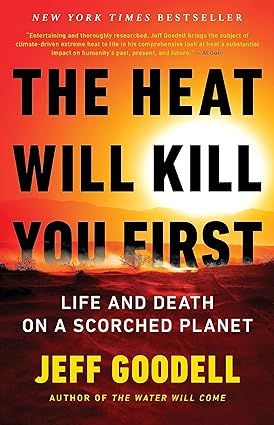PREVIOUS BOOK DISCUSSIONS
The Heat Will Kill You First by Jeff Goodell.
 The author is a climate reporter for Rolling Stone.
The author is a climate reporter for Rolling Stone.
This book has a lot of useful information, practical steps we need to take to protect the most vulnerable from extreme heat.
The Heat Will Kill You First is about the extreme ways in which our planet is already changing. It is about why spring is coming a few weeks earlier and fall is coming a few weeks later and the impact that will have on everything from our food supply to disease outbreaks. It is about what will happen to our lives and our communities when typical summer days in Chicago or Boston go from 90° F to 110°F. A heatwave, Goodell explains, is a predatory event—one that culls out the most vulnerable people. But that is changing. As heatwaves become more intense and more common, they will become more democratic. As an award-winning journalist who has been at the forefront of environmental journalism for decades, Goodell’s new book may be his most provocative yet, explaining how extreme heat will dramatically change the world as we know it.
Books are available to borrow from the library. Please join us for conversation on February 21 at 4 pm in the Community Room. Website (library): here
Nov 2023 Book:
The Nutmeg’s Curse by Amitav Ghosh
Discussion Questions here
 In this ambitious successor to The Great Derangement, acclaimed writer Amitav Ghosh finds the origins of our contemporary climate crisis in Western colonialism’s violent exploitation of human life and the natural environment.
In this ambitious successor to The Great Derangement, acclaimed writer Amitav Ghosh finds the origins of our contemporary climate crisis in Western colonialism’s violent exploitation of human life and the natural environment.
The Nutmeg’s Curse frames climate change and the Anthropocene as the culmination of a history that begins with the discovery of the New World and of the sea route to the Indian Ocean. Ghosh makes the case that the political dynamics of climate change today are rooted in the centuries-old geopolitical order that was constructed by Western colonialism. This argument is set within a broader narrative about human entanglements with botanical matter—spices, tea, sugarcane, opium, and fossil fuels—and the continuities that bind human history with these earthly materials. Ghosh also writes explicitly against the backdrop of the COVID-19 pandemic, the Black Lives Matter protests, and international immigration debates, among other pressing issues, framing these ongoing crises in a new way by showing how the colonialist extractive mindset is directly connected to the deep inequality we see around us today.
May 2023 Book:
Wednesday, May 24, 7:00 pm Braiding Sweetgrass by Robin Wall Kimmerer
 In this bestselling collection of essays, Indigenous scientist Robin Wall Kimmerer shows how other living beings—plants, berries, salamanders—offer us gifts and lessons, even if we’ve forgotten to hear their voices. Described by readers as “gentle, simple, tactile, beautiful, even sacred,” this book opens our eyes as to how acknowledgment and celebration of our reciprocal relationship with the rest of the living world can awaken a wider ecological consciousness.
In this bestselling collection of essays, Indigenous scientist Robin Wall Kimmerer shows how other living beings—plants, berries, salamanders—offer us gifts and lessons, even if we’ve forgotten to hear their voices. Described by readers as “gentle, simple, tactile, beautiful, even sacred,” this book opens our eyes as to how acknowledgment and celebration of our reciprocal relationship with the rest of the living world can awaken a wider ecological consciousness.
Books (and an audiobook) are available to borrow from the library. Please join us for conversation (and cookies) on May 24 at 7 pm in the Community Room.
Library Information here.
February 2023 Book:
 In collaboration with the Richmond Free Library, the discussion book this February is We Are the Weather, by Jonathan Safran Foer. Several copies are available at the Richmond library. It is a great read and we hope you will join the discussion on Wednesday, February 22nd, 2023 at 4 pm at the Richmond Free Library.
In collaboration with the Richmond Free Library, the discussion book this February is We Are the Weather, by Jonathan Safran Foer. Several copies are available at the Richmond library. It is a great read and we hope you will join the discussion on Wednesday, February 22nd, 2023 at 4 pm at the Richmond Free Library.
We Are the Weather explores the central global dilemma of our time in a surprising, deeply personal, and urgent new way.
The task of saving the planet will involve a great reckoning with ourselves―with our all-too-human reluctance to sacrifice immediate comfort for the sake of the future. We have, he reveals, turned our planet into a farm for growing animal products, and the consequences are catastrophic. Only collective action will save our home and way of life. And it all starts with what we eat―and don’t eat―for breakfast.
November 2022 Book:

In collaboration with the Richmond Free Library, we hosted discussion of Ministry for the Future by Kim Stanley Robinson. Described as “a masterpiece of the imagination,” the “cli-fi” novel speaks of how climate change will affect us all. In it, Robinson paints a picture of the world’s nations cooperating to address the climate crisis, succeeding in greatly lowering carbon emissions, and creating a livable future.
Copies of the book are currently available to borrow from the Richmond Library. All are welcome to join the discussion at the library on Wednesday, November 9, 2022 at 4 pm.
